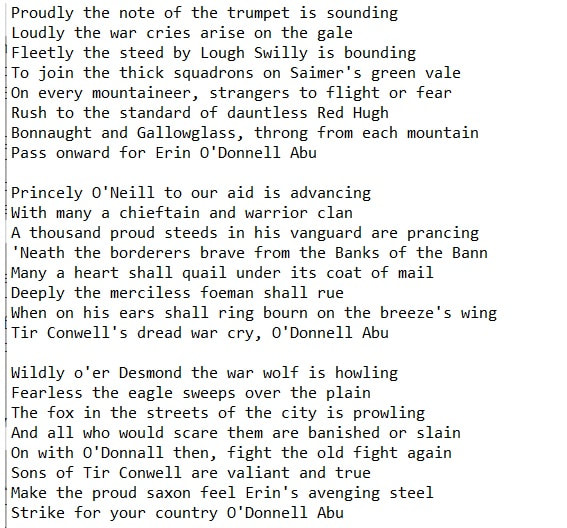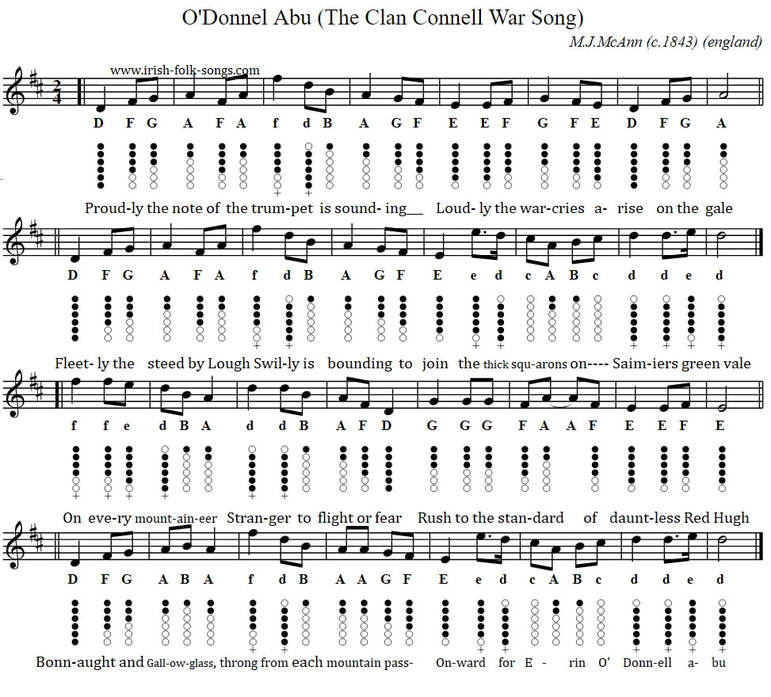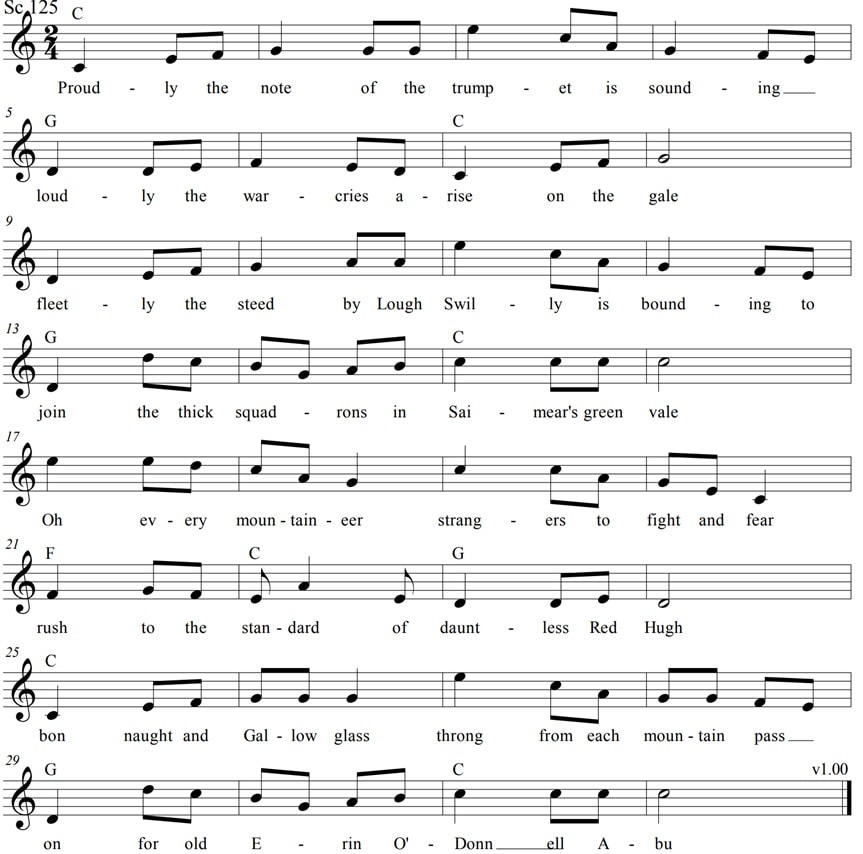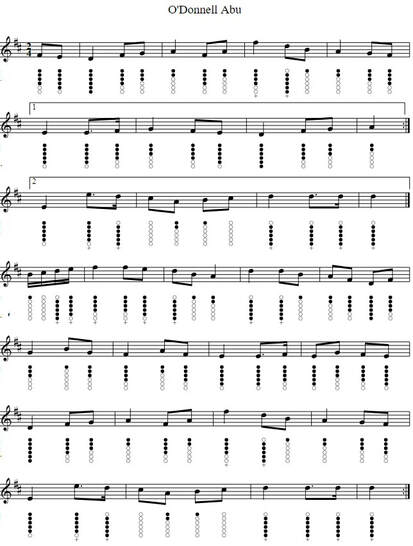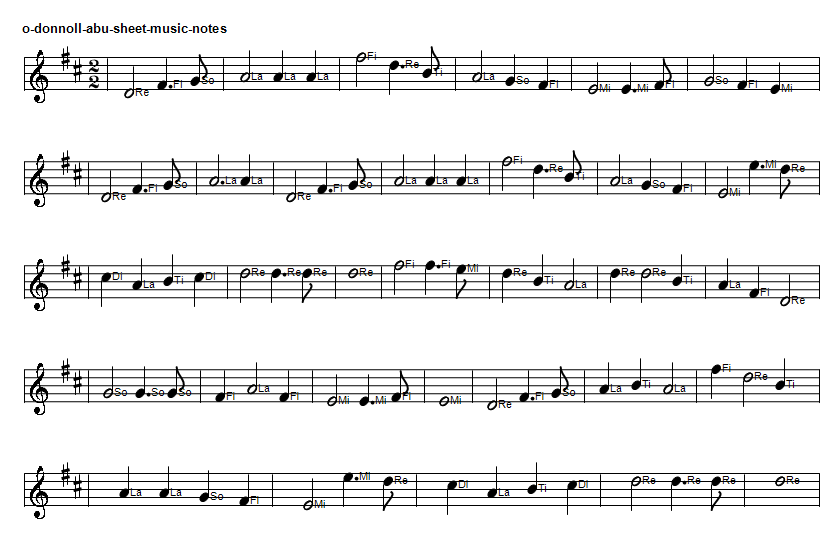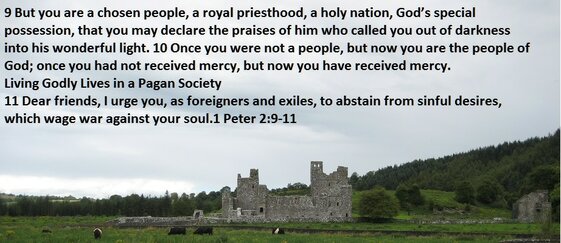O'Donnell Abu The Clancys Lyrics And Guitar Chords
O'Donnell Abu song lyrics and guitar chords was written around 1843 by Michael Joseph MacCann . O'Donnell abu sheet / Flute music notes in D Major in solfege style of do re mi now added.The video is of Liam Clancy and Tommy Makem. It was also recorded by Michael O'Duffey plus The Irish Brigade.The guitar chords are in C Major in chordpro. The song is an Irish war song about when Red Hugh O'Donnell was in charge of the rebellion that took place in Ireland against the British forces around 1593. The tin whistle sheet music and a youtube video is included.
The Irish song 'O'Donnell Abu' has been a symbol of Irish pride and resilience for centuries, embodying the spirit of the Irish people and their enduring struggle for independence. With its powerful lyrics and stirring melody, this song has become a rallying cry for the Irish, serving as a reminder of their rich history and cultural heritage.
The origins of 'O'Donnell Abu' can be traced back to the 16th century, during the reign of Hugh O'Neill, the powerful Irish chieftain known as the Earl of Tyrone. O'Neill was a prominent figure in the Nine Years' War, a rebellion against English rule in Ireland. The song is said to have been written by a bard in O'Neill's court, to commemorate his victory over the English at the Battle of Clontibret in 1595.
The lyrics of 'O'Donnell Abu' are a celebration of O'Neill's bravery and leadership, as well as a call to arms for the Irish people to rise up against their English oppressors. The chorus, which translates to 'O'Donnell forever, O'Donnell forever, O'Donnell to victory, to victory,' became a popular slogan among the Irish, inspiring them to continue their fight for freedom.
Over the years, 'O'Donnell Abu' has evolved into a symbol of resistance and national pride for the Irish. During the 19th century, as Ireland faced the devastating effects of the Great Famine and continued English domination, the song took on a new meaning, serving as a source of hope and strength for the Irish people.
During the Irish War of Independence in the early 20th century, 'O'Donnell Abu' once again became a rallying cry for the Irish. The song was often sung at political rallies and played at sporting events, serving as a unifying force for the Irish people in their struggle against British rule.
Today, 'O'Donnell Abu' continues to hold a special place in Irish culture and is often performed at events such as St. Patrick's Day celebrations and Gaelic football matches. The song's enduring popularity is a testament to its ability to evoke a sense of national pride and unity among the Irish people, transcending time and generations.
In addition to its cultural significance, 'O'Donnell Abu' also holds a place in the hearts of many Irish diaspora around the world. The song has been carried by Irish immigrants to countries such as the United States, Canada, and Australia, serving as a reminder of their roots and a connection to their homeland.
In conclusion, 'O'Donnell Abu' is a powerful and enduring symbol of Irish identity and resilience. Its lyrics and melody have stood the test of time, serving as a source of inspiration and strength for the Irish people throughout their history. As long as the Irish continue to sing 'O'Donnell Abu,' the spirit of their ancestors and their fight for freedom will live on.
The origins of 'O'Donnell Abu' can be traced back to the 16th century, during the reign of Hugh O'Neill, the powerful Irish chieftain known as the Earl of Tyrone. O'Neill was a prominent figure in the Nine Years' War, a rebellion against English rule in Ireland. The song is said to have been written by a bard in O'Neill's court, to commemorate his victory over the English at the Battle of Clontibret in 1595.
The lyrics of 'O'Donnell Abu' are a celebration of O'Neill's bravery and leadership, as well as a call to arms for the Irish people to rise up against their English oppressors. The chorus, which translates to 'O'Donnell forever, O'Donnell forever, O'Donnell to victory, to victory,' became a popular slogan among the Irish, inspiring them to continue their fight for freedom.
Over the years, 'O'Donnell Abu' has evolved into a symbol of resistance and national pride for the Irish. During the 19th century, as Ireland faced the devastating effects of the Great Famine and continued English domination, the song took on a new meaning, serving as a source of hope and strength for the Irish people.
During the Irish War of Independence in the early 20th century, 'O'Donnell Abu' once again became a rallying cry for the Irish. The song was often sung at political rallies and played at sporting events, serving as a unifying force for the Irish people in their struggle against British rule.
Today, 'O'Donnell Abu' continues to hold a special place in Irish culture and is often performed at events such as St. Patrick's Day celebrations and Gaelic football matches. The song's enduring popularity is a testament to its ability to evoke a sense of national pride and unity among the Irish people, transcending time and generations.
In addition to its cultural significance, 'O'Donnell Abu' also holds a place in the hearts of many Irish diaspora around the world. The song has been carried by Irish immigrants to countries such as the United States, Canada, and Australia, serving as a reminder of their roots and a connection to their homeland.
In conclusion, 'O'Donnell Abu' is a powerful and enduring symbol of Irish identity and resilience. Its lyrics and melody have stood the test of time, serving as a source of inspiration and strength for the Irish people throughout their history. As long as the Irish continue to sing 'O'Donnell Abu,' the spirit of their ancestors and their fight for freedom will live on.
Lyrics With Guitar Chords
[C]Proudly the note of the [Am]trumpet is [C]sounding
[G7]Loudly the war cries a[C]rise on the gale
Fleetly the steed by Lough [Am]Swilly is [C]bounding
To [G7]join the thick squadrons on [F]Saimer's green [C]vale
On every mountaineer, strangers to flight or fear
[F]Rush to the [C]standard of [G7]dauntless Red Hugh
[C]Bonnaught and Gallowglass, [Am]throng from each[C] mountain
Pass [G7]onward for Erin O'[F]Donnell A[C]bu
Princely O'Neill to our aid is advancing
With many a chieftain and warrior clan
A thousand proud steeds in his vanguard are prancing
'Neath the borderers brave from the Banks of the Bann
Many a heart shall quail under its coat of mail
Deeply the merciless foeman shall rue
When on his ears shall ring bourn on the breeze's wing
Tir Conwell's dread war cry, O'Donnell Abu
Wildly o'er Desmond the war wolf is howling
Fearless the eagle sweeps over the plain
The fox in the streets of the city is prowling
And all who would scare them are banished or slain
On with O'Donnall then, fight the old fight again
Sons of Tir Conwell are valiant and true
Make the proud saxon feel Erin's avenging steel
Strike for your country O'Donnell Abu.
There are a raft more lyrics and chords to The Clancy Brothers And Tommy Makem
in their section plus information on the group and their songs.
[C]Proudly the note of the [Am]trumpet is [C]sounding
[G7]Loudly the war cries a[C]rise on the gale
Fleetly the steed by Lough [Am]Swilly is [C]bounding
To [G7]join the thick squadrons on [F]Saimer's green [C]vale
On every mountaineer, strangers to flight or fear
[F]Rush to the [C]standard of [G7]dauntless Red Hugh
[C]Bonnaught and Gallowglass, [Am]throng from each[C] mountain
Pass [G7]onward for Erin O'[F]Donnell A[C]bu
Princely O'Neill to our aid is advancing
With many a chieftain and warrior clan
A thousand proud steeds in his vanguard are prancing
'Neath the borderers brave from the Banks of the Bann
Many a heart shall quail under its coat of mail
Deeply the merciless foeman shall rue
When on his ears shall ring bourn on the breeze's wing
Tir Conwell's dread war cry, O'Donnell Abu
Wildly o'er Desmond the war wolf is howling
Fearless the eagle sweeps over the plain
The fox in the streets of the city is prowling
And all who would scare them are banished or slain
On with O'Donnall then, fight the old fight again
Sons of Tir Conwell are valiant and true
Make the proud saxon feel Erin's avenging steel
Strike for your country O'Donnell Abu.
There are a raft more lyrics and chords to The Clancy Brothers And Tommy Makem
in their section plus information on the group and their songs.
hus
O’Donnell Abu Aonghus is a phrase that holds a significant meaning in Irish culture and history. It is a rallying cry that has been used for centuries by the O’Donnell clan, one of the most influential and powerful families in Ireland. Aonghus, also known as Aonghus the Red, was the Chief of the O’Donnell clan during the late 16th century, and his legacy has left a lasting impact on Irish history and folklore. This thesis will delve into the life of Aonghus, his contributions to Irish society, and the enduring significance of the phrase O’Donnell Abu Aonghus.
Aonghus was born in 1547 in Donegal, Ireland, to Hugh Dubh O’Donnell, the Chief of the O’Donnell clan, and his wife, Ineen Dubh. He was the second son of Hugh Dubh and was not expected to inherit the title of Chief. However, fate had other plans for Aonghus when his older brother, Calvagh, was killed in a battle with the O’Neills, the rival clan of the O’Donnells. This unexpected turn of events propelled Aonghus into the position of Chief at the young age of 17.
Under Aonghus’ leadership, the O’Donnell clan reached the peak of its power and influence. He was a skilled military leader and strategist, leading his clan to many victories against their enemies. Aonghus’ most notable achievement was the Battle of Acaill in 1595, where he defeated the English forces and secured the independence of Ulster from English rule. This victory cemented Aonghus’ place as a hero in the eyes of his people and solidified the O’Donnell clan as a force to be reckoned with.
Apart from his military prowess, Aonghus was also a patron of the arts and a great supporter of Irish culture. He was a patron of the renowned Irish poet, Tadhg Dall Ó hÚigínn, who composed many poems in praise of Aonghus and the O’Donnell clan. Aonghus was also a lover of music and was known to be a skilled harpist himself. He often hosted lavish feasts and celebrations, showcasing the rich cultural heritage of the O’Donnell clan.
The phrase O’Donnell Abu Aonghus has become synonymous with Aonghus and his clan. Abu is an Irish word that translates to “victory” or “triumph,” and it is often used as a rallying cry in battle. The addition of Aonghus’ name to the phrase reflects the deep admiration and respect that the O’Donnells had for their Chief. This phrase has been passed down through generations of the O’Donnell clan and is still used today to honor the memory of Aonghus and his contributions to Irish society.
Aonghus’ legacy extends beyond the O’Donnell clan and has left a lasting impact on Irish history and folklore. He is remembered as a great warrior, leader, and patron of the arts. His achievements in battle, his support for Irish culture, and his enduring legacy have made Aonghus a revered figure in Irish history. The phrase O’Donnell Abu Aonghus serves as a reminder of his bravery, determination, and unwavering loyalty to his people.
In conclusion, Aonghus the Red, the Chief of the O’Donnell clan, is a significant figure in Irish culture and history. His contributions to Irish society, both on the battlefield and in promoting Irish culture, have left a lasting impact. The phrase O’Donnell Abu Aonghus has become a symbol of Aonghus’ leadership and the enduring spirit of the O’Donnell clan. Aonghus’ legacy lives on, and his story continues to inspire generations of Irish people.
O’Donnell Abu Aonghus is a phrase that holds a significant meaning in Irish culture and history. It is a rallying cry that has been used for centuries by the O’Donnell clan, one of the most influential and powerful families in Ireland. Aonghus, also known as Aonghus the Red, was the Chief of the O’Donnell clan during the late 16th century, and his legacy has left a lasting impact on Irish history and folklore. This thesis will delve into the life of Aonghus, his contributions to Irish society, and the enduring significance of the phrase O’Donnell Abu Aonghus.
Aonghus was born in 1547 in Donegal, Ireland, to Hugh Dubh O’Donnell, the Chief of the O’Donnell clan, and his wife, Ineen Dubh. He was the second son of Hugh Dubh and was not expected to inherit the title of Chief. However, fate had other plans for Aonghus when his older brother, Calvagh, was killed in a battle with the O’Neills, the rival clan of the O’Donnells. This unexpected turn of events propelled Aonghus into the position of Chief at the young age of 17.
Under Aonghus’ leadership, the O’Donnell clan reached the peak of its power and influence. He was a skilled military leader and strategist, leading his clan to many victories against their enemies. Aonghus’ most notable achievement was the Battle of Acaill in 1595, where he defeated the English forces and secured the independence of Ulster from English rule. This victory cemented Aonghus’ place as a hero in the eyes of his people and solidified the O’Donnell clan as a force to be reckoned with.
Apart from his military prowess, Aonghus was also a patron of the arts and a great supporter of Irish culture. He was a patron of the renowned Irish poet, Tadhg Dall Ó hÚigínn, who composed many poems in praise of Aonghus and the O’Donnell clan. Aonghus was also a lover of music and was known to be a skilled harpist himself. He often hosted lavish feasts and celebrations, showcasing the rich cultural heritage of the O’Donnell clan.
The phrase O’Donnell Abu Aonghus has become synonymous with Aonghus and his clan. Abu is an Irish word that translates to “victory” or “triumph,” and it is often used as a rallying cry in battle. The addition of Aonghus’ name to the phrase reflects the deep admiration and respect that the O’Donnells had for their Chief. This phrase has been passed down through generations of the O’Donnell clan and is still used today to honor the memory of Aonghus and his contributions to Irish society.
Aonghus’ legacy extends beyond the O’Donnell clan and has left a lasting impact on Irish history and folklore. He is remembered as a great warrior, leader, and patron of the arts. His achievements in battle, his support for Irish culture, and his enduring legacy have made Aonghus a revered figure in Irish history. The phrase O’Donnell Abu Aonghus serves as a reminder of his bravery, determination, and unwavering loyalty to his people.
In conclusion, Aonghus the Red, the Chief of the O’Donnell clan, is a significant figure in Irish culture and history. His contributions to Irish society, both on the battlefield and in promoting Irish culture, have left a lasting impact. The phrase O’Donnell Abu Aonghus has become a symbol of Aonghus’ leadership and the enduring spirit of the O’Donnell clan. Aonghus’ legacy lives on, and his story continues to inspire generations of Irish people.
O'Donnell abu sheet music notes for tin whistle in D
O'Donnell abu sheet music notes in D Major in solfege, do re mi.
